Thousands of Arkansans would pay more for natural gas under an $87.7 million proposed utility rate increase, and lawmakers told leaders of the state’s utility regulator Monday they’re concerned constituents can’t afford it.
Summit Utilities, one of Arkansas’ natural gas providers, proposed a 30% rate increase for its approximately 525,000 customers in January. That was amended in an October settlement to instead raise rates by 23.4%. For the average household using 50 cubic feet of gas, that means an estimated monthly bill that’s $15.43 higher, plus a $4.37 monthly credit that’s about to roll off.

“We the taxpayers cannot afford this,” Sen. Linda Chesterfield, D-Little Rock, said during Monday’s Joint Insurance and Commerce committee meeting. “We’ve had an increase in our water bills, we’ve had an increase in our energy bills. The hospitals that are saying they’re OK with this are going to go up on their prices, and all of that’s going to be passed on to us.”
Summit Utilities acquired the customers of the former provider CenterPoint Energy after finalizing a $2.1 billion purchase in January 2022. In addition to questioning the motives of the proposed rate increase on Monday, lawmakers also called for an investigation into the utility sale.
As outlined in a motion from Sen. Jimmy Hickey Jr., R-Texarkana, the state Public Service Commission, which regulates utility rates, will investigate the possibility that CenterPoint Energy deferred approximately $300 million in maintenance. Hickey’s motion also directed the PSC to determine whether federal mandates partially caused the need for a rate increase and whether Summit Utilities did its due diligence before it purchased the company.
“We would expect it to be a very comprehensive report, which should include any recommendations for legislative changes to guard against any negative findings that you all may have found out about,” Hickey said.
Several lawmakers on Monday expressed concerns that Summit Utilities may have purchased the company knowing it would need additional funding for infrastructure improvements and ratepayers would pay for it through an increase.
“I don’t think they [Summit Utilities] would have paid $2.15 billion for a company and its assets — and taking on the role of this regulating monopoly understanding they’re going to have to spend more money —if they weren’t clear they were going to get their money back,” said Rep. Vivian Flowers, D-Pine Bluff.
GET THE MORNING HEADLINES.
The investigative report is due at the same time, or at nearly the same time, that the Public Service Commission decides to approve, deny or amend the 23.4% rate increase that parties agreed to earlier this month. The deadline is Nov. 22, and any increase would be implemented immediately.
Rep. Howard Beaty, R-Crossett, said Arkansans are already picking up overtime or working a second job to pay for necessities like natural gas.
“I would implore the commission to take those ratepayers and the timing of this rate increase into consideration when they make this decision, when you meet and fulfill [the] duty to take care of the ratepayers of Arkansas that haven’t been at the table,” Beaty said. “They’re at the table through the commission.”
An example of Arkansans left out of the conversation includes poultry growers, said Rep. Jon Eubanks, R-Paris. Eubanks said poultry growers have a heightened need for natural gas in cold months and he has talked with constituents who last winter said they experienced a $250 increase to their gas bill.
The current proposed increase would generate $87.7 million for the utility, which breaks down to about an average of $15 more per household per month. The calculation, however, is averaged over a 12-month period, and it’s likely that residents would pay much more during the upcoming winter months.

“The usage comes in the winter, and those monthly bills will be higher than $15 to $18 because the average is going to skew at that point,” said PSC Chairman Doyle Webb. “One of the negative factors here is that this rate increase hits right when gas usage goes up, and people will not have time to prepare for it.”
Webb, a former state lawmaker and chair of the state Republican party, is a well-known political figure. Gov. Sarah Huckabee Sanders appointed him to lead the Public Service Commission in January 2023. Webb’s wife is a state Supreme Court justice.
Webb and commissioners Katie Anderson and Justin Tate will vote on the proposed rate increase. The Public Service Commission also has staff that are recognized as a party in rate cases, which means that staff and commissioners do not share information about the case while it’s ongoing.
Other parties in the Summit Utilities rate case include Attorney General Tim Griffin and ratepayer coalitions that represent commercial, industrial and hospital consumers, as well as the University of Arkansas System. The parties expressed support for the 23.4% rate increase; the commission denied a request from Griffin to renegotiate after a settlement was agreed upon.
Per the CenterPoint purchase deal, Summit Utilities was unable to seek a rate adjustment during its first year in operation, but was expected to do so within 24 months. Michael Marchand, executive director of the Public Service Commission, said Summit Utilities has not changed its base rates since 2015.
If the Public Service Commission does not take action by Nov. 22, Summit Utilities’ initial rate increase proposal of 30% would take effect immediately, agency chief of staff Danni Hoefer said Monday.
Hoefer also said she believed the Public Service Commission would take action on or before the deadline.
YOU MAKE OUR WORK POSSIBLE.

